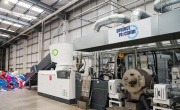01/09/21 - Business in Brief
Tesco and OLIO divert five million meals from food waste
In partnership with Tesco, food sharing app OLIO has diverted five million meals from food waste in the past year. Beginning in August 2020, the partnership prevents unsold surplus food fit for consumption from going to waste by distributing it within local communities.
Tesco primarily donates surplus food through its Community Food Connection scheme with national food redistribution network FareShare, which has been running since 2016. The scheme has provided more than 120 million meals to charities and community groups across the UK.
Where FareShare is unable to do so, OLIO ‘Food Waste Heroes’ collect food from charities and take it back to their homes. The items are then immediately uploaded onto the OLIO app, ready to be redistributed free of charge to those living nearby, as well as to community groups. OLIO app users can then pick items up, from an agreed, contact-free collection point.
Claire De Silva, Tesco Head of Communities, said: “Tesco is committed to tackling food waste and we were confident our partnership with OLIO would help with that, but its impact has exceeded all our expectations.
“For our partnership to have diverted more than 5 million surplus meals from going to waste in its first year is a huge achievement and shows the strength of the partnership between our store colleagues and OLIO’s Food Waste Heroes.”
Saasha Celestial-One, co-founder of OLIO, said: “Our partnership with Tesco has been a huge success this year, and we’re incredibly proud to have delivered so many meals that would have otherwise been wasted to communities across the UK. Tesco has been a true pioneer.
“But our work is far from done. We hope this partnership encourages other businesses to follow suit and consider how they can take a more proactive approach to minimising waste and supporting local communities. Just imagine what we could achieve if every business followed their lead.”
Geminor signs two new Danish waste wood contracts
Resource management company Geminor has announced the commencement of two new agreements for the handling and export of Danish waste wood.
The contracts with Danish companies Affaldplus and ARGO will see a total volume of 31,000 tonnes of the waste wood being managed annually, with the arrangements running until 2023. Geminor’s partnership with the two companies will take effect from 1 September, with approximately 19,000 tonnes of wood chip being handled annually for ARGO and around 12,000 tonnes annually for Affaldplus.
Prior to export, the waste wood will be collected and brought to Geminor’s HUB in Køge, where quality control will be carried out. The waste wood will then primarily be shipped to Latvia and Germany: here they will be used within the panelboard industry.
Country Manager for Geminor in Denmark, Kasper Thomsen, commented: “Material recycling of waste wood is one of the largest and most important examples of a circular economy in Europe today.
“Geminor recognizes the importance of this work and is increasing investments within waste wood both in Denmark and other markets in Europe, says Thomsen.
“The volumes that we now handle for ARGO and Affaldplus will be part of a new and important stream within material recycling of waste wood. We look forward to expanding our collaboration with both companies, and contributing to the most sustainable utilization of Danish waste wood possible.”
Recyclus Group imports new battery recycling machinery
Recyclus Group Ltd, a subsidiary of Technology Minerals, has announced that it will take delivery of a new lead acid battery breaker, to be shipped from Brazil.
The battery breaker will arrive in the UK around mid-September 2021 and will become operational in the first quarter of 2022. The machine’s ultimate destination will be Recyclus’ plant in the Midlands, in which the breaker will be used to separate the various lead elements, battery acids and plastic components for reuse.
The company states that, in the process, the plant will industrialise what is traditionally a ‘labour-intensive’ market, as well as targeting ‘zero to landfill’ and ‘zero to incinerator’ strategy for used lead acid battery stock.
Alex Stanbury, CEO of Technology Minerals and Director of Recyclus, commented: “The lead battery market, globally, will reach US$95bn by 2026, and with continued demand for vehicles this will increase.
“In the UK, the lead-acid battery recycling industry is also a major polluter. Spent lead-acid batteries are incinerated, and 18,000 tonnes are produced each year in the UK.
“We have the opportunity to use hydrometallurgical processes to reduce the carbon footprint of lead-acid batteries by 85 per cent, cut slag by over 90 per cent, and recycle the plastics as well as the lead within these batteries to help meet increased demand. Our new plant on order from Brazil will help us to achieve those targets, and we look forward to having it fully operational by the first quarter of 2022.”





